In this two-part series Al Jazeera meets an extended family of (Somalilander) immigrants, including Sahra Halgan, navigating their lives in six different countries.
Countries with a multicultural approach, like Canada, the US and Great Britain, encourage immigrants to keep their customs and culture. Others, like France and Denmark, urge immigrants to integrate and adopt Western values.
We look at the story of one immigrant family that was separated due to a civil war. They tell about their lives in their adopted country, and about their hopes for the future.
| Episode 1 |
|
|
| In the world today, there at least 10 million people on the move, looking for safety, comfort and a better life. But they are not always welcomed when they arrive in a new land, and the arguments over how to integrate these newcomers are emotional and sometimes explosive. |
|
But what about the people who are at the centre of this debate? What do they think of their new countries, and how have they been received?
In this film, we meet an extended family of immigrants who now live in six different countries.
Some of them are distant cousins, some, are close relatives.
They all come from the same part of the world: the Horn of Africa – Somaliland, a place that has been torn apart by civil war for the last 30 years.
This is their story in their words.
| Episode 2 |
|
|
| Immigration is a highly emotional issue in today’s world, and opinions on the subject are often sharply divided. |
In some Western countries, harsher rules have made it more difficult for immigrants, and diversity is sometimes seen in a negative light.
Meanwhile, in other countries like the United Kingdom, Canada and the United States – which allow or even encourage immigrants to keep their culture – that idea is frequently coming under attack.
In Holland, France and Denmark, we watched as one extended family deals with the rising anti-immigrant tide in continental Europe.
In this episode we see whether members of this family feel more integrated living in three multicultural societies.
This film was directed by Jon Kalina – Written by Jon Kalina, Josh Freed, Stephanie Binet.
Meet the family
We meet an extended family of immigrants from Somaliland and discover how they now live in six different countries.
They all come from the same part of the world: the Horn of Africa, Somaliland, a country torn apart by civil war for the last 30 years.
Countries with a multi-cultural approach, like Canada, the USA and Great Britain, encourage immigrants to keep their customs and culture. However, others, like France and Denmark, urge immigrants to integrate and adopt Western values.
In each country, the family members talk about their lives in their adopted homecountry and their hopes for the future.
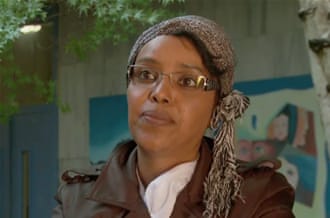 |
| Sahra Halgan Ahmed |
Sahra Halgan Ahmed
Sahra is a single mother raising four children in France. As a young woman Sahra was caught up in her country’s civil war. At that time, she was a nurse who used to sing for the troops.
In the Somaliland community Sahra was a famous singer, but like many immigrants this status did not translate to her new country.
When she arrived in Lyon 20 years ago, Sahra was housed like many immigrants, outside of the city centre in a public housing project called La Duchere. Today, Sahra works as a janitor in one of the local schools.
“Doing this job in Somaliland? Never, never. If they ever saw me doing this work, they’d be very disappointed. But that’s life and we are not in Somaliland. We are in Europe. You know when I was living at La Duchere, people would say ‘Ah, those people are living off our tax dollars.’ I really hate to hear that it’s because they work and we don’t that we are fed. But in the end, I’m proud to eat and I deserve to eat. So don’t tell me I’m lazy and I don’t work.”
 |
| Yahye |
Yahye
Yahye is Sahra’s oldest son, who was born in France and who was recently kicked out of school for setting off firecrackers. Yahye has since been placed in a new school a few hours away from their family home.
He says he and his friends are often bullied because of their race.
“I don’t want to carry those ideas in my head. It will fill me with doubt and waste my time. Am I going to start off with a handicap? No, I want to go ahead with my life doing what I want, black or not.”
 |
| Mohamed and Fowzia Samater |
Mohamed and Fowzia Samater
They are the elders of the clan in Holland. Mohamed, who is in his late 60’s, was an army officer in the rebel army of Somaliland.
At the end of the 1980’s, he very nearly died in shellfire but with the help of a Dutch army officer he managed to get himself and his family into Holland.
When they arrived, Mohamed could not walk and he received medical care from a Dutch hospital. Later on, the entire Samater family made of seven children became Dutch citizens.
“The police here told me that since I had so many children perhaps they could help me take care of them. They were very nice but as a mother that was very hard to hear. I told them, no. When we came here, it was very easy to become a citizen. Now it’s much harder. It’s become very tough.”
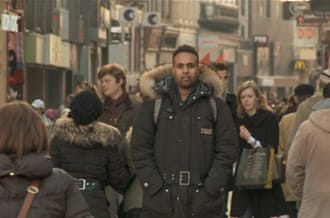 |
| Abdi Samater |
Abdi Samater
Abdi, 23, is one of Mohamed and Fowzia’s sons. Abdi was born in Somaliland but he came to Holland when he was still quite young and considers it as his first country.
His family has lived in a three story house in Amsterdam since the 1990’s.
Abdi, who speaks Dutch fluently, is a receptionist in a medical clinic.
“I feel accepted, people are nice to me now, but language is the first thing for immigrants to know. No matter what, language is number one. Language is the key for them. Then they say, you know, ‘ He speaks our language, it’s good. You know, he’s one of us.’ It’s not only language, you know, to feel accepted. Language is not everything, as I see it.”
 |
| Musse Sheikh |
Musse Sheikh
Musse is a distant cousin of the Samater family. He came to Copenhagen from his native Somaliland over 30 years ago, before the start of his country’s disastrous civil war.
Having completed his studies, he had to wait before finding a good job in a hospital lab, where he now works in Bio-medicine.
Musse, who is a Danish citizen, has gone to great lengths to blend into Danish society. An important part of that is belonging to a club where he plays basketball weekly, as well as becoming active in politics by being somewhat of a spokesman for the Somalian community in Denmark. He often visits those who are trying to get refugee status.
“Everybody is fighting to get the best votes and the money votes are in now hating the foreigners…The Somalis, the Palestinians. The weakest of the weakest. My advice? I have no advice. I’m desperate just like they are and I feel the pain. I cry with it, and it crush me, really. I tell you. But we will try to change the government. We are going to change this government.”
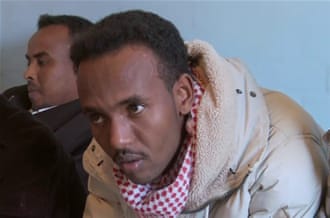 |
| Ismail Mohamed |
Ismail Mohamed
Ismail Mohamed grew up in Denmark but was brought back to Somalia by his mother who left him there when she returned to Europe. It took him nine years to get back to the country he thinks of as home as they would not let him back in.
He currently resides north of Copenhagen at Sandholm in an old military camp that for the last ten years has housed refugee claimants.
Out of the more than 600 asylum seekers many are Somali. Those who have to stay at Sandholm often spend years waiting to find out if they will be accepted as refugees or sent back home. While there they can neither work nor go to school.
“I crossed the Sahara desert. I crossed the ocean. I stepped over dead bodies. I was ready to die. I wish that the people here knew the price I paid to get to this country. If you looked inside my body you’d find the word ‘Denmark’ written there.”
 |
| Ayan Samater |
Ayan Samater
Ayan is the youngest daughter in the Samater family. She works in a clothing store in one of Amsterdam’s most mixed neighbourhood.
Although her father would like her to wear the traditional head covering, he does not insist.
“They see me as a Somali girl. As a Dutch, I don’t think they will see; maybe when I talk Dutch, Maybe they’ll think, ‘Ah, she can speak really good Dutch’ but I think they will see straight away, a Somali girl. Definitely.”
 |
| Jama Dirir |
Jama Dirir
Jama is another member of the Samater family. He has been living in Denmark since 1997, in a small city outside of Copenhagen called Koge. Jama chose Denmark because he already had brothers living there.
He hopes that a good education will make it possible for his children to integrate into Danish society, even though, his brothers had that education and each one of them eventually gave up and left.
Jama has helped to start a programme at his local library that uses volunteers to tutor immigrant children and help them with their homework.
“I’m here for my kids – to work hard with my kids. I got the chance for an education and I want my kids to have the same chance because it’s very important. They will have more choices in life and that will really help them.”
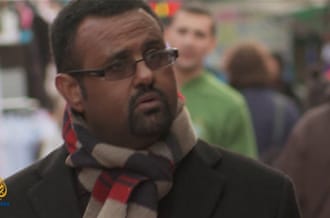 |
| Mohamed Maigag |
Mohamed Maigag
Unable to return to war-ravaged Somaliland Mohamed came to the UK in the mid 1980’s via Saudi Arabia. Now he has a comfortable life in north London. It is not a fancy neighbourhood, but it is peaceful.
Mohamed’s passions are the politics of his troubled homeland, hence his decision to lead a Somali Association in North London. He also loves football; his son Fouad loves the game, too.
“Twenty years ago, the immigration system was receptive. People were more friendly. There was no Islamaphobia. There was a lot of respect for diversity. But since September 11 in the United States and since the July 7 bombings, I think people now are skeptical about immigrants, asylumseekers, new cultures … not as before.”
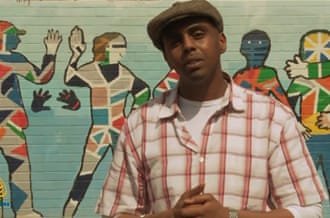 |
| Hamdi Ahmed |
Hamdi Ahmed
Hamdi Ahmed is Mohamed Maigag’s brother-in-law, he grew up in public housing in London. Right wing rhetoric has come into the neighbourhoud. Even among the young men he grew up with.
“Twenty years ago, when I first moved in here, everything you see here, wasn’t here. It was pubs, Irish clubs, and it was just a whole neighbourhood of white people. I stood out like a sore thumb. So, you know, we’ve come a long way now. I could walk here a hundred times, and nobody would notice me, you know? Cause I blend in; it’s multi-cultural now. It’s changed for the better. I came here when I was eight, so, this is all I know. I grew up here. So, if anything, this is home. I’m here to stay, whether you like it or not.”
 |
| Keyse Ibrahim |
Keyse Ibrahim
Keyse Ibrahim is a cousin of Mohamed Maigag’s. He settled in the US, in Minneapolis, Minnesota, more than 10 years ago, where he now works as a chef in a restaurant.
His big project is to become a US Citizen but he has a past police arrest that is hanging over his head. The exam itself seems very easy for Keyse but the old arrest still worries him.
“I can tell sometimes there is discrimination going on, you know because there is not only one way to be discriminating, but it’s a different way to be discriminating because we are black; we are Muslim; we’re immigrant, we Africans; we whatever. But you know what I say? “Man, you can do whatever you want; man I need to go where I want to go. You know if I need a job I’m going to apply whether you give me or not.”
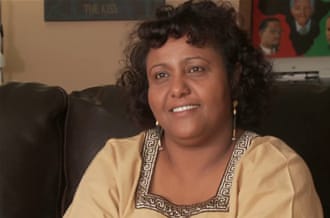 |
| Samsam Ahmed |
Samsam Ahmed
Samsam is a cousin of Keyse Ibrahim. She has lived in Canada for 20 years and has worked hard to raise two older children, one in high school and one in university. Recently, a family member could not handle a new-born, so Samsam decided to adopt her.
Samsam is a social worker who has helped a lot of newcomers meeting the challenges of being in a new country. She is comfortable in the urban environment of Ottawa, but she wonders how she would be in the rest of the country.
“There are times in my daily life where I’m reminded by others that I’m not originally one of the people from here but that’s OK; that’s OK because in my heart, I’m a citizen. This is where I am now; this is my land. This is where I will be; this is where I’ve established myself. This is where my next generation’s going to be; this is where their next generation’s going to be. This is home; just like the immigrants before me came here. I’m here now.”
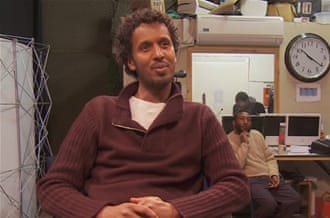 |
| Mohamed Aden |
Mohamed Aden
Britain’s diverse ethnic groups often have their own television shows. One that is devoted to Somalians is called Somali Voice.
A regular guest is a cousin of Mohamed Maigag’s, Mohamed Aden.
“ If young people are portrayed as Jihadists or you know, radicalists. Their identity and self-esteem could be really challenged. And that’s the problem.”
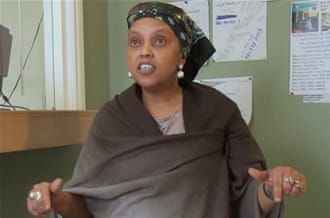 |
| Zaida |
Zaida
Zaida is SamSam’s friend who lives in Fort MacMurry, an urban service area in Alberta, Canada.
Immigrants in a place like Fort McMurray are not working just for themselves, as they are sending money back home to Somalia where the normal banking system isn’t very good. Most Somali immigrants use a money transferring system, the Dahabshiil. Zaida runs a branch of the Dahabshiil out of a tiny office.
“All the families, they will split in the world. Some people, they live in Europe, in America, in Canada. Our people live everywhere. That’s why this bank is appreciated, you know. To send the money, to help each other’s whole family.”
 |
| Moulid |
Moulid
Moulid is a cousin of SamSam’s. He fled Mogadishu for Kenya in 1991, before the UN brought him to Canada where he now works as a bus driver.
“I’m a Somali Canadian. I’m a Canadian citizen. Also proud to be a Canadian. I’m 100 percent sure my children, they weren’t even calling themselves Somali Canadian but they will say we are Canadian.”
Source: Al Jazeera




























